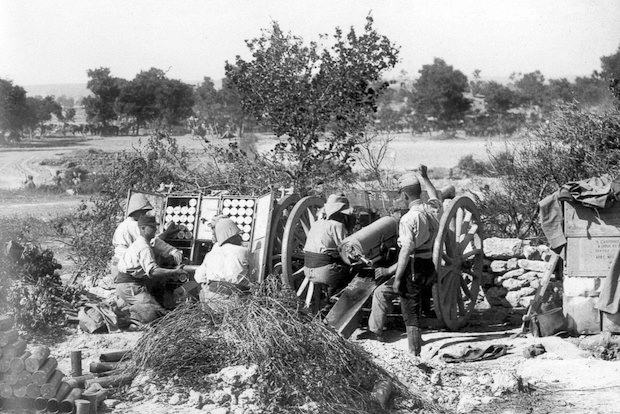From The Spectator, 21 November 1914:
The papers of Tuesday and Wednesday contained two exceptionally interesting despatches from an eyewitness at Sir John French’s headquarters. These descriptive narratives have improved remarkably in value since the beginning of the war—a fact which does not seem to be in the least appreciated by some newspapers. The despatch of Wednesday described the operations from November 4th to 9th. During that period the Germans nowhere made an attack comparable with their attack on Ypres at the end of October. Their object seemed to be to wear out the British troops by incessant bombardment. Every attack or demonstration by German infantry resulted in great losses. And the British troops never had any doubt about their own ability to repulse all these efforts. “The consciousness that they had repelled one great effort [that at the end of October] was a moral factor of no small value.” The eyewitness has been enormously impressed by the French field-guns—les soixante-quinze. Their effect, he says, against a suitable target ” is literally terrific and must be seen to be realized.”
The Germans also regularly delivered night attacks, which never succeeded or looked like succeeding. They were made apparently in order to annoy our troops and prevent them from sleeping, yet the Germans lost great numbers of men in these enterprises. “On the whole,” says the eye-witness, “there is evidence that the Germans are beginning to be affected by their heavy losses.” Among the prisoners there are young recruits who have had no practice in musketry or entrenching. On the other hand, the writer warns his readers against making too much of these facts, and he ends with a notable tribute to German bravery :—
“Whatever deterioration there may be,” he says, “in the material now being drafted into the ranks of our enemy, it must be admitted that the Prussian war machine, acting on a nation previously inured to the sternest discipline, has obtained the most remarkable results. The Germans have up to the present time been able to make good their losses, to continue to deliver repeated blows with fresh men when required and where required… In spite of lack of officers, in spite of inexperience, boys of sixteen and seventeen have faced our guns, marched steadily up to the muzzles of our rifles, and have met death in droves, without flinching. Such is the effect of a century of national discipline.”





Comments